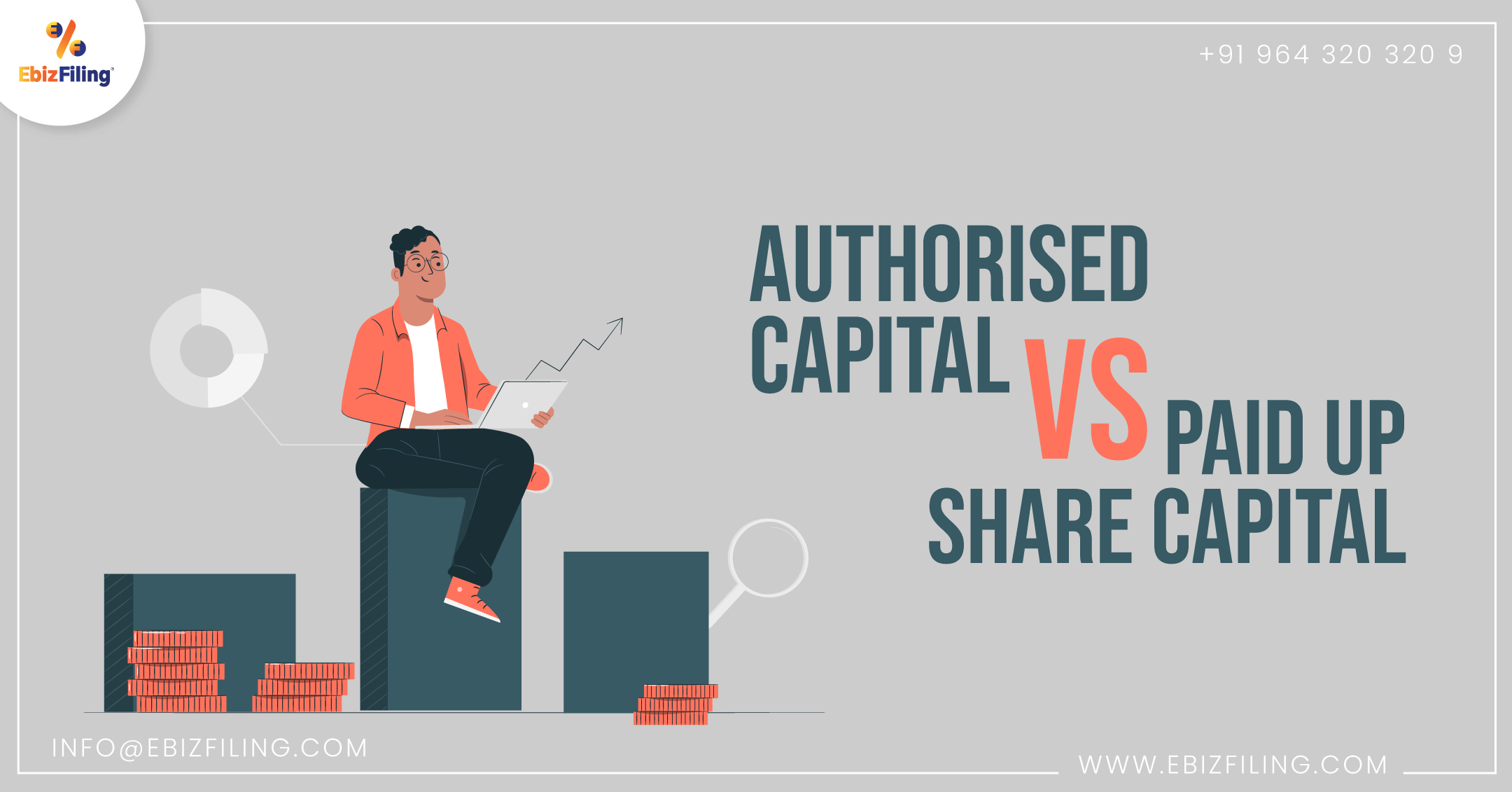
-
May 13, 2022
What is Authorised Capital and Paid up capital? And Difference between Authorised Capital and Paid up Share Capital
Introduction
Companies issue stock to raise capital for a variety of reasons, including expansion, debt repayment, and so on. Regardless of the size or type of business, every company must classify its share capital in the financial statement under numerous categories. In this article information on the Difference between Authorised Capital and Paid up Capital, “What is Authorized Capital?” And “What is Paid up share capital?”
What is Authorized Capital?
The highest amount of share capital that a company can issue is known as authorized share capital, also known as registered capital or nominal capital. When the firm is formed, this amount will be agreed upon. If the shareholders wish, this amount can be increased later. It is the maximum amount of capital a firm can raise through the issuance of shares. It is the maximum amount of shares that a corporation can issue.
Authorized Capital Characteristics
-
The authorized capital is determined at the time of the company’s formation and incorporation.
-
ROC fees will rise in accordance with the amount of approved capital.
-
Authorized Capital of a company needs to be specified in the MOA and AOA of a Company.
-
The authorised share capital is the maximum amount of capital that a company can have and is used to determine the nominal value of each share.
-
It can be modified at any moment after the company’s establishment.
-
The company’s net worth cannot be calculated using authorised capital.
-
A firm does not have to issue shares up to its authorised capital; it can issue shares with a lower value.
Benefits of Authorised Capital
-
The company may focus on its business expansion without borrowing money or obtaining finances from other traditional sources thanks to the additional revenue gained from stock sales.
-
The company can offer more pay to its investors, shareholders, partners, senior management, employees enrolled in equity ownership plans, founders, and owners with increased cash inflow.
-
The company’s overall net worth improves when more share capital is added. As a result, the company’s borrowing capacity is increased.
What is Paid up Share Capital?
Paid Up Share Capital is the amount of capital against which the company has received payments from shareholders. When a firm sells its stock, it generates paid-up capital. Paid up capital will always be less than allowed capital because a corporation cannot issue shares in excess of its permitted capital. Paid up capital can be either fully or partially paid up.
Paid up Share Capital Characteristics
-
It is classified as called up capital because it has been paid by the shareholders and received by the corporation.
-
The firm must issue shares within 60 days of its incorporation, in the amount determined as paid-up capital during incorporation.
-
Authorized capital cannot exceed paid-up capital.
-
The money received as paid-up capital can be utilized to cover the company’s operating costs.
-
Paid-up capital is factored into the company’s net value assessment.
Difference between Authorised Capital and Paid up Share Capital
|
Authorized Capital |
Paid up Share Capital |
|
The maximum value of the shares distributed to shareholders is termed as Authorized Capital. |
The sum paid to the company by its shareholders for its funding is termed as Paid-up Share Capital. |
|
To raise it, MoA must alter it according to the manner outlined above. |
It is done through a private placement or the issuance of shares. |
|
This capital is not responsible for calculating the company’s or business’s net worth. |
The quantity of paid-up capital is utilized to cover business expenses. Paid-up capital is utilised in the net worth calculation instead of permitted capital. Although the balance sheet mentions both authorised and paid-up capital, only Paid up Capital is used to calculate the firm’s net value. |
|
A minimum amount of capital is required for all new firms, which is Rs 1 lakh for private limited companies and Rs 5 lakh for public limited companies. |
Paid-up capital cannot be the same as authorised capital; it must be significantly lower or equal. |
|
A Company cannot issue shares in excess of its authorised share capital. |
A company’s paid-up capital can never exceed its authorised capital, although it can be equal to it at any time. |
Conclusion
A company’s capital structure is divided into two categories: Authorised share capital and paid up share capital. The total amount of shares a business can issue to its shareholders is its authorized capital, whereas the total amount of shares it has actually issued to its shareholders is its paid-up capital.
Increase Your Share Capital
Get in touch with EbizFiling for seamlessly complying regarding Increase in Authorised Share Capital.
About Ebizfiling -










Reviews
Mansi Mehra
14 Jul 2018I really appreciate the selfless support shown by your team. Cheers!
Priyanka
19 Mar 2019Great work by ebiz team. Very supportive. Highly recommended.
Rohit Jain
18 Mar 2019Appreciate their services. Really had great experience while registering a firm.
February 27, 2025 By Team Ebizfiling
Legal Implications of Articles of Association (AOA) under company Law In Company Law, the AOA (Articles of Association) outlines a company’s internal rules, regulations, and governance structure. It defines how the company manages its operations, specifying the rights and responsibilities […]
February 12, 2025 By Team Ebizfiling
Difference Between Executive and Non-Executive Director Introduction Directors are pivotal to the success and governance of any organization. Among them, the roles of executive and non-executive directors stand out as distinct, both in responsibilities and contributions. Understanding the difference between […]
May 24, 2025 By Team Ebizfiling
What Are the taxation rules for LLC? Taxation rules for LLC for a Limited Liability Company (LLC) in the United States involves understanding its distinct structure and applicable regulations. LLCs provide flexible tax options and reduced personal liability, making compliance […]